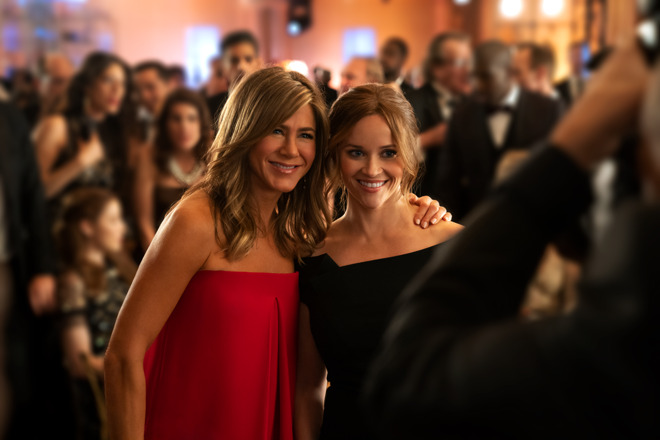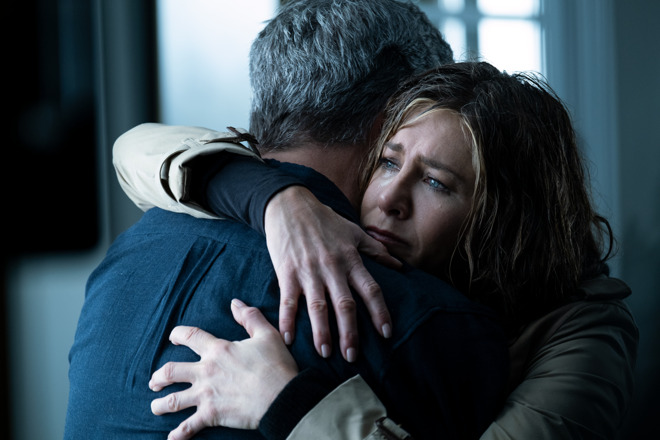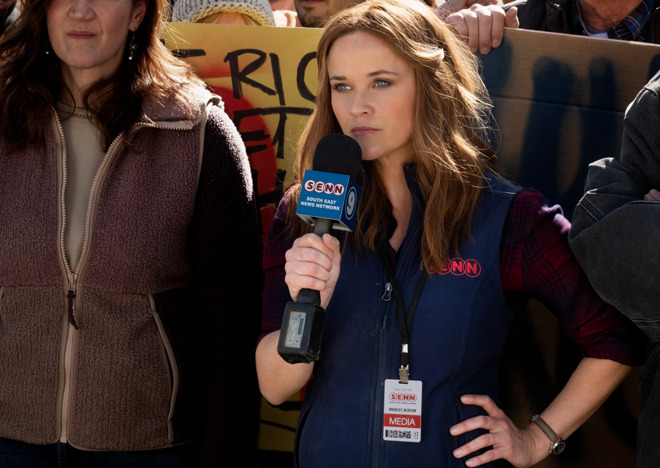Apple TV+ review: don't wake up for 'The Morning Show' just yet
Apple's "The Morning Show" packs all the power, pageantry and prestige you'd expect from a series anchoring the launch of the company's new Apple TV+ streaming service, but it sadly has yet to find its voice.

Jennifer Aniston and Reese Witherspoon in "The Morning Show," premiering November 1 on Apple TV+. (Photo courtesy of Apple)
Ever since The Morning Show was first announced two years ago, it's been pretty clear that the series represents Apple's bid for a star-studded, prestige drama series, the kind of ultra-expensive, buzzed-about show that would get the service on the map, get people talking, and ultimately contend for Emmys and Golden Globes.
The show has three A-list actors in Jennifer Anniston, Steve Carrell, and Reese Witherspoon on top of a cast otherwise filled with recognizable names. It has the sort of premise likely to get it a lot of media attention, as shows about the media tend to do. All this comes at a cost -- The Morning Show reportedly had a $300 million price tag for the two seasons ordered to date, making it the most expensive TV series in history on a per-episode basis.
The show, based on the three episodes that AppleInsider has seen, is a well-acted and handsomely-produced effort. Aniston and Witherspoon -- who played sisters on a couple of episodes of Friends -- work well together. But what the show doesn't have is much of a distinct voice or point of view, nor does it have much of note to say about cable news, media, or any of its other ostensible subjects.
The show stars Aniston -- in her first TV series role since Friends went off the air 15 years ago -- as Alex Levy, the longtime anchor of The Morning Show, a Today-like network TV show. In the first episode, her longtime co-anchor Mitch Kessler (Steve Carell) is fired due to a sexual misconduct scandal, leading to turmoil -- especially after we learn that her bosses (Mark Duplass and Billy Crudup) were plotting to push Alex out prior to Mitch's firing.
Meanwhile, Bradley Jackson (Reese Witherspoon, in a rare on-screen use of her Southern accent) is a small-time TV news reporter from Virginia who gets brought into the fold after her rant at a protest goes viral.
The first episode is clearly inspired by the firing of Matt Lauer from The Today Show in November 2017, a story that also broke in the middle of the night, and has been in the news of late due to revelations in a new book about complicity by NBC executives. Through Carell's character, the show dives deep into the question of what happens to famous men after they lose their careers to #MeToo scandals.
Kerry Ehren, the other co-writer, following an arbitration, received a "developed by" credit, while Mimi Leder, the primary director of the HBO series The Leftovers, directed the first installment. Then, the Lauer scandal took place early on during The Morning Show's development, altering plans for the show.
There are also seven different credited executive producers, including both lead actresses.
Original reports about The Morning Show stated that it was inspired by CNN host Brian Stelter's book Top of the Morning, about the morning TV wars of about a decade ago. That book is not mentioned in the credits, although Stelter is credited as a consulting producer.
The show The Morning Show most resembles, at least on the surface, is The Newsroom, Aaron Sorkin's HBO series from 2012 to 2014 which was also star-studded and also depicted life behind the scenes at a news show. The difference is, The Morning Show isn't nearly as smug, nor does its dialogue mostly serve as a mouthpiece for the views of a single behind-the-scenes creator.
The Morning Show, instead, has the opposite problem, as it seems to have no point of view at all.
In fact, after three episodes, it's not quite clear if the show is arguing for more objectivity in news, or less, or in favor of more hard news or less. When it does take stands -- such as a speech by Witherspoon in the third episode about the unfair standards for women in the news industry -- they're not exactly original ones. The show's #MeToo points are sort of undercut by the plot in which a woman is given a high-profile job without her permission or consent.
There is one aspect, however, that is particularly Sorkin-esque. It's that scene in the first episode when a protester confronts Witherspoon and calls her a "fake news bitch," at which point she responds with a long, impassioned speech that sounds nothing like anything any real human being would say.
This ridiculous speech, of course, goes viral and boosts her career, even though it's a reporter losing her cool and showing a lack of objectivity. It brings to mind CNN anchor Chris Cuomo's recent viral meltdown over being called "Fredo," which did not redound to Cuomo's benefit.
The show, also, like The Newsroom, doesn't seem to know or care much about the Internet, social media, and how they affect the news today. Strange, from a show produced by a tech company.
There are plenty of Apple products in the show, however, as you'd might expect. Everyone has iPhones and, one scene, an executive (Duplass) has a meeting with Witherspoon and is distracted throughout by his iPhone and MacBook. It can do that, as most of the other Apple TV+ shows aren't set in contemporary times.
Jennifer Aniston in "The Morning Show," premiering November 1 on Apple TV+. (Courtesy of Apple)
Carell is outstanding in what's essentially a villain role, of a disgraced celebrity who believes that he didn't anything wrong, besides have affairs with colleagues, and that he's a victim of an overzealous witch hunt. At one point, in a discussion with an also-accused movie director friend (Martin Short), he floats a documentary about the lives of famous men accused by #MeToo -- which is something that Charlie Rose once really did propose.
Yes, there's sexuality, and controversial and political subject matter. The show's "political" content seems to mostly involve repeatedly describing Witherspoon's character as a conservative, when we don't see much indication that she actually is.
The worst case is probably that it resembles the fate of The Newsroom itself, which was pitched directly to media elite types who turned against the show nearly immediately, leading to it only lasting three seasons.
The Morning Show has already been renewed for a second season, which will give it plenty of time to find its voice. But through the first three episodes, it certainly hasn't yet.

Jennifer Aniston and Reese Witherspoon in "The Morning Show," premiering November 1 on Apple TV+. (Photo courtesy of Apple)
Ever since The Morning Show was first announced two years ago, it's been pretty clear that the series represents Apple's bid for a star-studded, prestige drama series, the kind of ultra-expensive, buzzed-about show that would get the service on the map, get people talking, and ultimately contend for Emmys and Golden Globes.
The show has three A-list actors in Jennifer Anniston, Steve Carrell, and Reese Witherspoon on top of a cast otherwise filled with recognizable names. It has the sort of premise likely to get it a lot of media attention, as shows about the media tend to do. All this comes at a cost -- The Morning Show reportedly had a $300 million price tag for the two seasons ordered to date, making it the most expensive TV series in history on a per-episode basis.
The show, based on the three episodes that AppleInsider has seen, is a well-acted and handsomely-produced effort. Aniston and Witherspoon -- who played sisters on a couple of episodes of Friends -- work well together. But what the show doesn't have is much of a distinct voice or point of view, nor does it have much of note to say about cable news, media, or any of its other ostensible subjects.
Stars assemble
The show stars Aniston -- in her first TV series role since Friends went off the air 15 years ago -- as Alex Levy, the longtime anchor of The Morning Show, a Today-like network TV show. In the first episode, her longtime co-anchor Mitch Kessler (Steve Carell) is fired due to a sexual misconduct scandal, leading to turmoil -- especially after we learn that her bosses (Mark Duplass and Billy Crudup) were plotting to push Alex out prior to Mitch's firing.
Meanwhile, Bradley Jackson (Reese Witherspoon, in a rare on-screen use of her Southern accent) is a small-time TV news reporter from Virginia who gets brought into the fold after her rant at a protest goes viral.
The first episode is clearly inspired by the firing of Matt Lauer from The Today Show in November 2017, a story that also broke in the middle of the night, and has been in the news of late due to revelations in a new book about complicity by NBC executives. Through Carell's character, the show dives deep into the question of what happens to famous men after they lose their careers to #MeToo scandals.
Trouble behind the scenes
The Morning Show, according to numerous media reports, has had nearly as much turmoil as its fictional counterpart. Creator Jay Carson was pushed out relatively early on, although he's still credited as creator and co-writer of the first episode.Kerry Ehren, the other co-writer, following an arbitration, received a "developed by" credit, while Mimi Leder, the primary director of the HBO series The Leftovers, directed the first installment. Then, the Lauer scandal took place early on during The Morning Show's development, altering plans for the show.
There are also seven different credited executive producers, including both lead actresses.
Original reports about The Morning Show stated that it was inspired by CNN host Brian Stelter's book Top of the Morning, about the morning TV wars of about a decade ago. That book is not mentioned in the credits, although Stelter is credited as a consulting producer.
The Anti-Newsroom
The show The Morning Show most resembles, at least on the surface, is The Newsroom, Aaron Sorkin's HBO series from 2012 to 2014 which was also star-studded and also depicted life behind the scenes at a news show. The difference is, The Morning Show isn't nearly as smug, nor does its dialogue mostly serve as a mouthpiece for the views of a single behind-the-scenes creator.
The Morning Show, instead, has the opposite problem, as it seems to have no point of view at all.
In fact, after three episodes, it's not quite clear if the show is arguing for more objectivity in news, or less, or in favor of more hard news or less. When it does take stands -- such as a speech by Witherspoon in the third episode about the unfair standards for women in the news industry -- they're not exactly original ones. The show's #MeToo points are sort of undercut by the plot in which a woman is given a high-profile job without her permission or consent.
There is one aspect, however, that is particularly Sorkin-esque. It's that scene in the first episode when a protester confronts Witherspoon and calls her a "fake news bitch," at which point she responds with a long, impassioned speech that sounds nothing like anything any real human being would say.
This ridiculous speech, of course, goes viral and boosts her career, even though it's a reporter losing her cool and showing a lack of objectivity. It brings to mind CNN anchor Chris Cuomo's recent viral meltdown over being called "Fredo," which did not redound to Cuomo's benefit.
The show, also, like The Newsroom, doesn't seem to know or care much about the Internet, social media, and how they affect the news today. Strange, from a show produced by a tech company.
There are plenty of Apple products in the show, however, as you'd might expect. Everyone has iPhones and, one scene, an executive (Duplass) has a meeting with Witherspoon and is distracted throughout by his iPhone and MacBook. It can do that, as most of the other Apple TV+ shows aren't set in contemporary times.
The fired anchor speaks

Jennifer Aniston in "The Morning Show," premiering November 1 on Apple TV+. (Courtesy of Apple)
Carell is outstanding in what's essentially a villain role, of a disgraced celebrity who believes that he didn't anything wrong, besides have affairs with colleagues, and that he's a victim of an overzealous witch hunt. At one point, in a discussion with an also-accused movie director friend (Martin Short), he floats a documentary about the lives of famous men accused by #MeToo -- which is something that Charlie Rose once really did propose.
Yes, there's sexuality, and controversial and political subject matter. The show's "political" content seems to mostly involve repeatedly describing Witherspoon's character as a conservative, when we don't see much indication that she actually is.
The bottom line
The series is likely to appeal to those interested in media and celebrity gossip, as well as the many fans of the two main actresses. The best case scenario, for Apple, is if The Morning Show is its version of Big Little Lies, the HBO series that has essentially collected famous actresses -- including Witherspoon -- and ridden that to buzzy status.The worst case is probably that it resembles the fate of The Newsroom itself, which was pitched directly to media elite types who turned against the show nearly immediately, leading to it only lasting three seasons.
The Morning Show has already been renewed for a second season, which will give it plenty of time to find its voice. But through the first three episodes, it certainly hasn't yet.



Comments
Steve Carell isn’t even in season two. (Maybe he will be replaced with Oprah:)
Flop.
As an example look at GOT in the beginning to GOT at the end after they became A-listers.
The best media requires integrity of vision and focus. It is not necessarily something you can buy with exorbitant salaries, compromise and the scuttling of courage because of a fear to offend.
Shame I initially thought it was an actual live morning show with stars and comedy thrown in.
I mean, it goes beyond #metoo -- how do they adapt to the disinformation age? Does the show take place in an alternate universe where the status quo pre-2010 has continued on into the present?